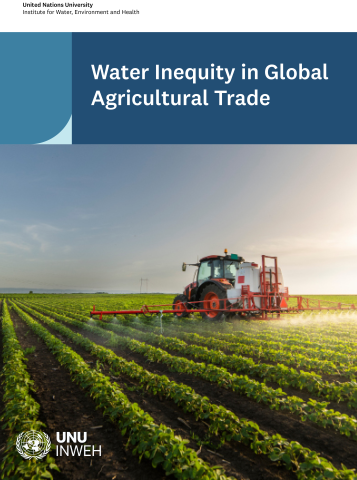UNU-INWEH Report: Qin, Y., Gu, W., AghaKouchak, A., Liu, Y., Madani, K., Ni, J. (2025). Water Inequity in Global Agricultural Trade. United Nations University Institute for Water, Environment, and Health (UNU-INWEH), Richmond Hill, Ontario, Canada, doi: https://doi.org/10.53328/INR25AMG001
DOWNLOAD PDF

Freshwater is crucial for achieving the United Nations’ 2030 Sustainable Development Goals (UN SDGs). However, water scarcity remains a significant global issue, affecting over 2 billion people and creating a major obstacle to reaching the SDGs. The agricultural sector's heavy reliance on water and the virtual transfer of water through agricultural trade play a key role in influencing regional water availability, inequality, and inequity. This report by the United Nations University Institute for Water, Environment and Health (UNU-INWEH) investigates these impacts to inform policies that align water management, trade, and social equity. The report distinguishes between water use inequality, which is the uneven distribution of resources, and water use inequity, which highlights the disproportionate impact on poorer populations. Addressing both is essential for achieving the SDGs related to poverty and social justice.
The report finds that this trade generally alleviates water scarcity for a large portion of the global population, with developed countries benefiting more than developing ones. For example, 75% of the population in developed countries benefit from reduced scarcity, while in developing countries, 62% of the population benefits, but 37% experience increased scarcity. This reflects the disproportionate impact on lower-income groups. Trade can increase inequality and inequity in regions like northern Africa and Saudi Arabia, while improvements are seen in China and some other African countries. Developing countries face a higher prevalence of increased inequality and inequity (29% of the population), with trade-related imbalances often driving these unjust outcomes.
The report emphasizes that policymakers must address both water scarcity and inequity. While international agricultural trade can help alleviate water scarcity, it often increases inequality and inequity, especially in developing countries. Policymakers should consider the impact of water management and trade strategies on the most vulnerable populations. Aligning trade policies with sustainable water practices, such as investing in water infrastructure and efficient irrigation, is key. The report also recommends adopting sustainable agricultural methods, like precision farming and drought-resistant crops, and fostering regional cooperation to ensure fair distribution of costs and benefits. Achieving sustainable development requires integrated water and trade policies that protect vulnerable populations and ensure the benefits of trade are equitably distributed.



